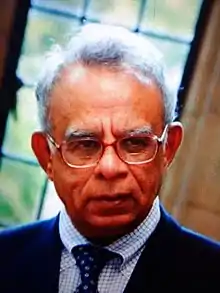Wasim Sajjad
Wasim Sajjad (Urdu: وسیم سجاد; born 30 March 1941) is a Pakistani conservative politician and lawyer who served as the acting President of Pakistan for two non-consecutive terms and as the Chairman of the Senate between 1988 and 1999.[1]
Wasim Sajjad | |
|---|---|
وسیم سجاد | |
 Wasim Sajjad (2016) | |
| Acting President of Pakistan | |
| In office 2 December 1997 – 1 January 1998 | |
| Prime Minister | Nawaz Sharif |
| Preceded by | Farooq Leghari |
| Succeeded by | Rafiq Tarar |
| In office 18 July 1993 – 14 November 1993 | |
| Prime Minister | Moeenuddin Qureshi (Caretaker) Benazir Bhutto |
| Preceded by | Ghulam Ishaq Khan |
| Succeeded by | Farooq Leghari |
| 3rd Chairman of the Senate | |
| In office 24 December 1988 – 12 October 1999 | |
| Preceded by | Ghulam Ishaq Khan |
| Succeeded by | Mohammad Soomro |
| Interior Minister of Pakistan | |
| In office 29 March 1987 – 28 July 1987 | |
| President | Zia-ul-Haq |
| Prime Minister | Muhammad Junejo |
| Preceded by | Nadir Pervez |
| Succeeded by | Aslam Khattak |
| Law and Justice Minister of Pakistan | |
| In office 20 September 1986 – 4 December 1988 | |
| President | Zia-ul-Haq |
| Prime Minister | Muhammad Junejo |
| Preceded by | Aitzaz Ahsan |
| Succeeded by | Sharifuddin Pirzada |
| Personal details | |
| Born | Wasim Sajjad 30 March 1941 Jalandhar, Punjab, British India (now in Punjab, India) |
| Citizenship | |
| Nationality | |
| Political party | Pakistan Muslim League (Q) (2002–present) |
| Other political affiliations | Islami Jamhoori Ittehad Pakistan Muslim League (N) |
| Parents | Justice Sajjad Ahmad Jan |
| Residence | Islamabad, Pakistan |
| Alma mater | Army Burn Hall College Punjab University BA, MA Oxford University LLB, MA Inns of Court School of Law Barrister-at-Law |
| Cabinet | Zia Cabinet |
| Website | Senate biography |
Born in Jalandhar, British India, Sajjad's father (Justice Sajjad Ahmad Jan) went on to serve as a judge of the Supreme Court, later becoming Chief Election Commissioner of Pakistan. Sajjad studied at the Army Burn Hall before moving to Lahore where he studied law at the Punjab University. As a Rhodes Scholar, he moved to Oxfordshire, where he received his Bachelor of Civil Law followed by a graduate degree in Jurisprudence from the Wadham College, Oxford in 1967. He was called to the Bar at the Inner Temple in 1968.[2] On return to Pakistan, Sajjad was admitted as a lawyer in Pakistan and joined the Punjab Law College where he taught constitutional law between 1967 and 1977.[3]
Political career
Sajjad was elected as to the Senate in 1985 as a member of the center-right Muslim League and served as the Minister for Law and Justice from September 1986 to December 1988, until December 1988 when he was elected as Chairman of the Senate where he remained until 1997. During which he served as acting President of Pakistan twice during the general elections.[1] In 1999, Sajjad joined a defecting group that supported General Musharraf's coup and became the Leader of the House in the Senate of Pakistan in 2003, remaining until his political retirement in 2008.[4] After the imposition of the coup by General Pervez Musharraf, Sajjad joined the PML(Q) and again became a senator. This time he served as Leader of the House in the Senate of Pakistan from March 2003 to March 2008. Thereafter he served as Leader of the Opposition from 2010 until 2012.[1] After retiring from politics, he has been serving as chancellor of the National University.[5]
In 2002, Sajjad was accused of mis-use of government vehicles and phones, amounting to millions of rupees. He was ordered to pay a fine, but served no time in jail.[6]
See also
References
- Govt. Pakistan. "Wasim Sajjad: A Senator's work". www.senate.gov.pk/. Senate Secretariat Press. Retrieved 2 February 2015.
- "Who is Who | Wasim Sajjad | Pride of Pakistan | Legal Services". prideofpakistan.com. Retrieved 4 December 2016.
- Scholar of the Week. "Pakistan's Rhodes Scholars". www.rhodeshouse.ox.ac.uk/. Scholar of the Week. Retrieved 2 February 2015.
- Ashraf Mumtaz (18 September 2006). "Wasim Sajjad declined to become CJP". Dawn. Retrieved 2 August 2013.
- FAST-NU. "Officers of University". www.nu.edu.pk/. FAST-NU. Retrieved 2 February 2015.
- Maryam Hussain (2002). "Wasim Sajjad off the Hook, while others rot in jail". South Asia Tribune. Retrieved 20 September 2007.



